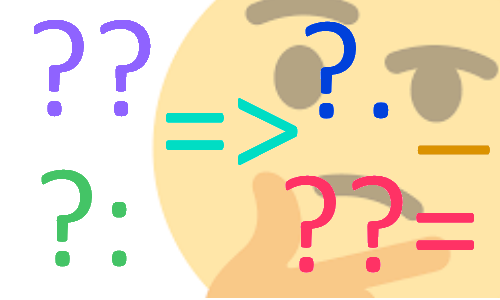Tricky Operator Names in C#
A list of symbol based C# operators, what they do and the links to documentation for times when searching question marks doesn't return what I want.

With more syntactic sugar making its delicious way into ever increasing C# versions, we get symbol based operators with names escape me. Except my friend and I seem to always remember ??, or the null-coalescing operator. It's a catchy name. ¯\_(ツ)_/¯
This post isn't new and revolutionary. It's a reference post for future me when Google doesn't return the documentation for ?.. The explanations are just going to be linked and lifted from official Microsoft documentation. Here's to you, future me.
??
The null-coalescing operator ?? returns the value of its left-hand operand if it isn't null; otherwise, it evaluates the right-hand operand and returns its result. The ?? operator doesn't evaluate its right-hand operand if the left-hand operand evaluates to non-null.
??=
The null-coalescing assignment operator ??= assigns the value of its right-hand operand to its left-hand operand only if the left-hand operand evaluates to null. The ??= operator doesn't evaluate its right-hand operand if the left-hand operand evaluates to non-null.
?:
The conditional operator ?:, also known as the ternary conditional operator, evaluates a Boolean expression and returns the result of one of the two expressions, depending on whether the Boolean expression evaluates to true or false.
?.
The null-conditional operator applies a member access, ?., or element access, ?[], operation to its operand only if that operand evaluates to non-null; otherwise, it returns null.
!.
The null-forgiving operator or null-suppression operator tells the compiler/static analysis engine during development time that the value will not be null.
=>
The => token is supported in two forms: as the lambda operator and as a separator of a member name and the member implementation in an expression body definition.
_
Discards are temporary, dummy variables that are intentionally unused in application code.
Bonus Round: LINQ Syntax
You know how LINQ can look like code but can also somewhat look like SQL? They're called Method Syntax and Query Syntax respectively. Docs found here. Though I also find the Method Syntax is often called Fluent Syntax too.
Bonus 2: ? or Nullable Value/Reference Types
Technically not an operator, but ? is also frustrating to search for. Nullable value docs, nullable reference docs.